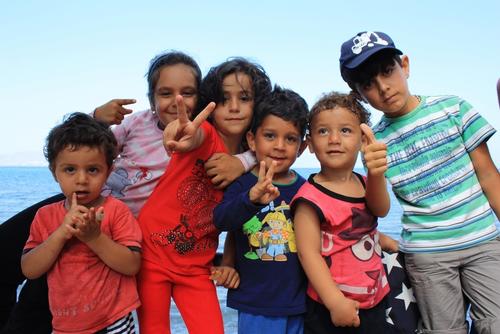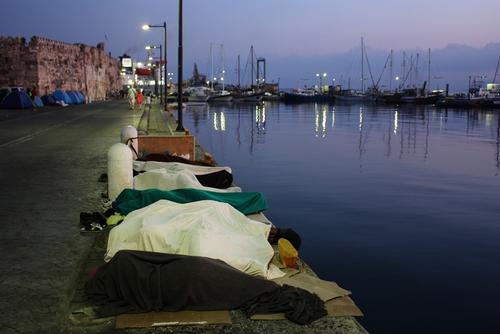«Κανένας δεν αφήνει την πατρίδα του,
εκτός αν πατρίδα είναι το στόμα ενός καρχαρία
τρέχεις προς τα σύνορα μόνο όταν βλέπεις
ολόκληρη την πόλη να τρέχει κι εκείνη
οι γείτονές σου τρέχουν πιο γρήγορα από σένα
με την ανάσα ματωμένη στο λαιμό τους
το αγόρι που ήταν συμμαθητής σου
που σε φιλούσε μεθυστικά πίσω από το παλιό εργοστάσιο τσίγκου
κρατά ένα όπλο μεγαλύτερο από το σώμα του
αφήνεις την πατρίδα
μόνο όταν η πατρίδα δε σε αφήνει να μείνεις.
κανένας δεν αφήνει την πατρίδα εκτός αν η πατρίδα σε κυνηγά
φωτιά κάτω απ΄ τα πόδια σου
ζεστό αίμα στην κοιλιά σου
δεν είναι κάτι που φαντάστηκες ποτέ ότι θα έκανες
μέχρι που η λεπίδα χαράζει απειλές στο λαιμό σου
και ακόμα και τότε ψέλνεις τον εθνικό ύμνο
ανάμεσα στα δόντια σου
και σκίζεις το διαβατήριό σου σε τουαλέτες αεροδρομίων
κλαίγοντας καθώς κάθε μπουκιά χαρτιού
δηλώνει ξεκάθαρα ότι δεν πρόκειται να γυρίσεις.
πρέπει να καταλάβεις
ότι κανένας δε βάζει τα παιδιά του σε μια βάρκα
εκτός αν το νερό είναι πιο ασφαλές από την ξηρά
κανένας δεν καίει τις παλάμες του
κάτω από τρένα, ανάμεσα από βαγόνια
κανένας δεν περνά μέρες και νύχτες στο στομάχι ενός φορτηγού
τρώγοντας εφημερίδες
εκτός αν τα χιλιόμετρα που ταξιδεύει
σημαίνουν κάτι παραπάνω από ένα ταξίδι.
κανένας δε σέρνεται
κάτω από φράχτες
κανένας δε θέλει να τον δέρνουν
να τον λυπούνται
κανένας δε διαλέγει τα στρατόπεδα προσφύγων
ή τον πλήρη σωματικό έλεγχο σε σημεία
όπου το σώμα σου πονούσε
ή τη φυλακή,
επειδή η φυλακή είναι ασφαλέστερη
από μια πόλη που φλέγεται
και ένας δεσμοφύλακας το βράδι
είναι προτιμότερα από ένα φορτηγό
γεμάτο άντρες που μοιάζουν με τον πατέρα σου
κανένας δε θα το μπορούσε
κανένας δε θα το άντεχε
κανένα δέρμα δε θα ήταν αρκετά σκληρό
για να ακούσει τα:
γυρίστε στην πατρίδα σας μαύροι
πρόσφυγες
βρομομετανάστες
ζητιάνοι ασύλου
που ρουφάτε τη χώρα μας
αράπηδες με τα χέρια απλωμένα
μυρίζετε περίεργα
απολίτιστοι
κάνατε λίμπα τη χώρα σας και τώρα θέλετε
να κάνετε και τη δική μας
πώς δε δίνουμε σημασία
στα λόγια
στα άγρια βλέμματα
ίσως επειδή τα χτυπήματα είναι πιο απαλά
από το ξερίζωμα ενός χεριού ή ποδιού
ή τα λόγια είναι πιο τρυφερά
από δεκατέσσερις άντρες
ανάμεσα στα πόδια σου
ή οι προσβολές είναι πιο εύκολο
να καταπιείς
από τα χαλίκια
από τα κόκαλα
από το κομματιασμένο κορμάκι του παιδιού σου.
θέλω να γυρίσω στην πατρίδα,
αλλά η πατρίδα είναι το στόμα ενός καρχαρία
πατρίδα είναι η κάνη ενός όπλου
και κανένας δε θα άφηνε την πατρίδα
εκτός αν η πατρίδα σε κυνηγούσε μέχρι τις ακτές
εκτός αν η πατρίδα σού έλεγε να τρέξεις πιο γρήγορα
να αφήσεις πίσω τα ρούχα σου
να συρθείς στην έρημο
να κολυμπήσεις ωκεανούς
να πνιγείς
να σωθείς
να πεινάσεις
να εκλιπαρήσεις
να ξεχάσεις την υπερηφάνεια
η επιβίωσή σου είναι πιο σημαντική.
κανένας δεν αφήνει την πατρίδα εκτός αν η πατρίδα είναι
μια ιδρωμένη φωνή στο αυτή σου
που λέει
φύγε,
τρέξε μακριά μου τώρα
δεν ξέρω τι έχω γίνει
αλλά ξέρω ότι οπουδήποτε αλλού
θα είσαι πιο ασφαλής απ΄ ό,τι εδώ»
Η Ουαρσάν Σάιρ γεννήθηκε στην Κένυα και μεγάλωσε στην Αγγλία. Η πρώτη πλήρης ποιητική συλλογή της αναμένεται να κυκλοφορήσει το 2016, ωστόσο έχει ήδη τιμηθεί με διάφορα βραβεία, μεταξύ αυτών το Βραβείο Αφρικανικής Ποίησης από το Πανεπιστήμιο Brunel (2013).
[Πηγή: www.doctv.gr]
Mediterranean Migration: “Refugees sleeping on the streets of Kos tell me, ‘At home we had war, but at least we had dignity’”
By MSF psychologist Marina Spyridaki
18 September 2015








Δεν υπάρχουν σχόλια :
Δημοσίευση σχολίου
Εδώ σχολιάζεις εσύ - Comment Here
Σημείωση: Μόνο ένα μέλος αυτού του ιστολογίου μπορεί να αναρτήσει σχόλιο.